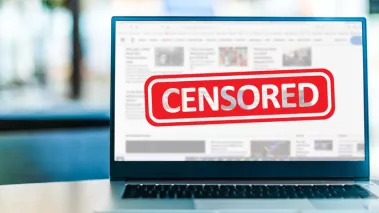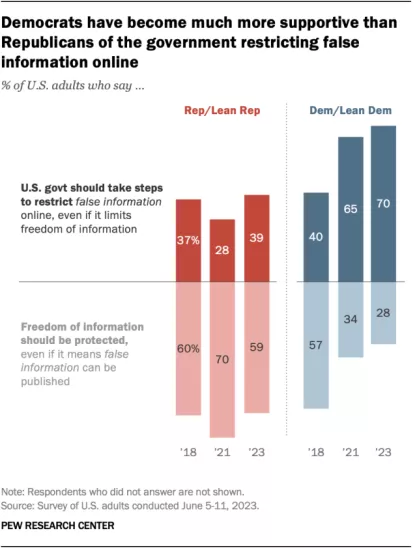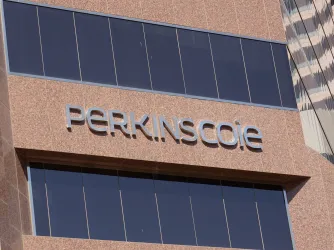Table of Contents
Majority of Americans want government and social media companies to police misinformation and disinformation

Shutterstock.com
Since 2018, the Pew Research Center has asked thousands of Americans if either the government or technology companies should do more to filter online content, including restricting access to false information — an intervention which Americans have long been wary of.
Well, Pew asked that question again this year, and the results are depressing.
The Pew survey reveals Americans are more likely now than at any time in the past several years to favor restrictions on online content. Two-thirds of Americans would support a private company moderating content online while 55% would support the federal government doing the same, the latter up from 39% in 2018. The Pew survey includes responses from 5,115 adults in the United States and was conducted from June 5 to 11.

Although support for the federal government restricting access to false information online has grown across the board in recent years, a partisan divide on the issue has emerged. In 2018, the difference between Republicans and Democrats on this issue was negligible (37% and 40%, respectively). Today, the percentage of Republicans in favor of the federal government regulating online content remains similar, at 39%, while support has surged to 70% among Democrats.
Similarly, Democratic support for tech companies restricting access to false information has increased over the years, from 60% in 2018 to 81% today. Republican support stayed the same at 48% in both years.

FIRE remains concerned by calls for either the government or technology companies to play a larger role in policing online content. Last year, FIRE sued the state of New York to challenge its unconstitutional law requiring social media networks to address speech that could “vilify” or “humiliate” people based on a protected class such as race, gender, or religion.

Misinformation versus disinformation, explained
Issue Pages
Confusingly, the terms are used interchangeably. But they are different — and the distinction matters.
And in FIRE’s official statement on free speech and social media, we warned that efforts to coerce either tech companies or private citizens to moderate or sanitize online content are likely to backfire:
Any government intrusion into platforms’ editorial discretion threatens the platforms’ own expressive rights under the First Amendment — and potentially that of other speakers. Solutions that reduce the scope and power of the First Amendment are likely to be no solutions at all, and their effects will almost certainly reverberate beyond social media.
As the Supreme Court declared in Reno v. ACLU (1997), online expression does not receive fewer First Amendment protections than other forms of protected speech. As Justice John Paul Stevens wrote for the majority:
As a matter of constitutional tradition, in the absence of evidence to the contrary, we presume that governmental regulation of the content of speech is more likely to interfere with the free exchange of ideas than to encourage it. The interest in encouraging freedom of expression in a democratic society outweighs any theoretical but unproven benefit of censorship.
The fact that the tide of public opinion seems to be turning in the opposite direction is very concerning.
Advocating for institutions, particularly government institutions, to determine for the rest of us what is true or dangerous is antithetical to maintaining a democratic government or a well-informed citizenry. Outsourcing our ability to decide for ourselves what’s true or false — or good or bad — will invite abuse and allow the most powerful people and institutions to warp public debate to their benefit, to the detriment of anyone with dissenting views.
Recent Articles
FIRE’s award-winning Newsdesk covers the free speech news you need to stay informed.

Harvard’s resistance to Trump is a model for US universities

Sixty-one media organizations and press freedom advocates contest Perkins Coie executive order — First Amendment News 466

Harvard stands firm, rejects Trump administration’s unconstitutional demands


